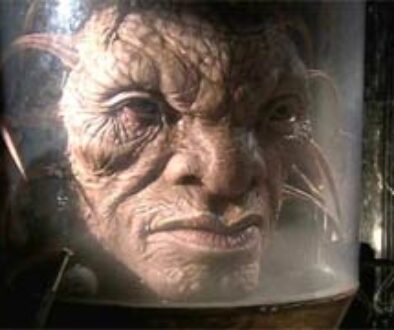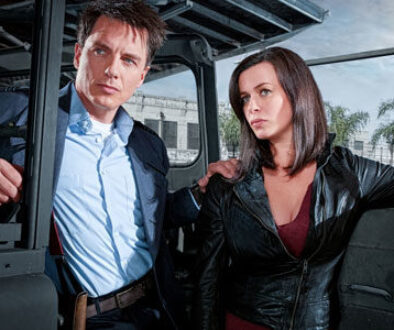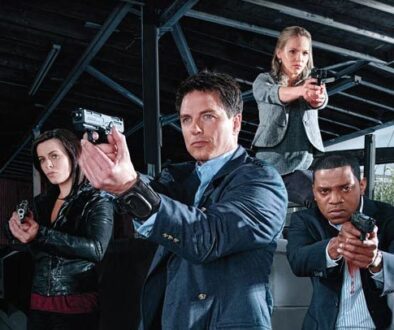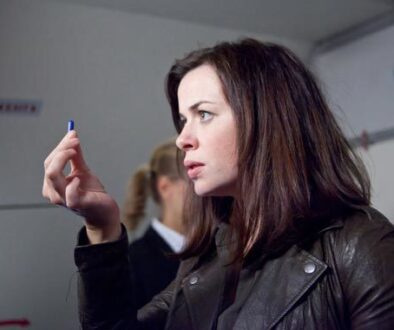2011 In Review: Torchwood

With the new year rapidly approaching, Clint Hassell takes look back at how 2011 changed the Whoniverse by examining in-depth each of the three Who-related series, starting with Torchwood: Miracle Day.

What worked: Starz as co-production company
Executive producer Russell T Davies has stated that Miracle Day wouldn’t have been produced without the involvement of U.S. subscription channel Starz. Despite Children of Earth’s success, the BBC was unwilling to completely finance another series of Torchwood. Two-thirds of the budget came not from the BBC, but from Starz. Most importantly, the guiding force behind Miracle Day remained Davies, who was allowed to guide the development of the series without Starz’ “creative input,” or the edict to make the series “more American.” In addition to financing the majority of production, Starz sponsored well-organized premiere events that reiterated their pride in being part of Torchwood’s rich history and their support for Davies’ creative vision. A prominent ad campaign emphasized Torchwood’s place as a featured program within the network’s roster of original series.
What didn’t work: the Starz backlash
Despite these facts, fans decried Starz’ involvement due to the production companies one request – that episodes air in the U.S. first, preventing the series’ ratings from suffering due to Internet piracy. It was the BBC’s decision to air each episode six days after its American premiere, yet the ire of legions of uninformed fans was directed towards Starz, the U.S., and American culture in general.
 What didn’t work: Davies embracing the U.S. scriptwriting system
What didn’t work: Davies embracing the U.S. scriptwriting system
In previous series of Doctor Who, Davies would write a one-paragraph pitch that described the basic concept of each story. Davies then assigned episodes to individual writers who were responsible for creating fully-realized scripts. Davies then rewrote every script to maintain consistency in tone and characterization. This practice is not common in the United States, where storylines are created communally during lengthy brainstorming sessions involving writers and producers, and the narrative for a large part of a program’s season is outlined. Individual writers then complete scripts, which do not receive major rewrites from the executive producer. By being created within a system that bends to group consensus instead of one commanding vision, the tone and characterization within Miracle Day were inconsistent with previous series of Torchwood.
 What didn’t work: lazy scriptwriting shortcuts – including the complete disregard of science
What didn’t work: lazy scriptwriting shortcuts – including the complete disregard of science
Parts of Miracle Day just didn’t make any sense:
- When a forward-traveling truck came to an immediate stop, its cargo of metal rods flew backward, instead of continuing forward
- A handgun was used to shoot off a padlock (with armed guards mere feet away, no less)
- Gwen used the I-5s to communicate with Jack, despite having a radio and a cell phone on her person
- Angelo married a woman who allows him to not only stalk Jack, but to display photos of – and openly discuss – his former lover
- An iPhone served as a thermal imager
- Gwen was somehow convinced that her gentle, blustering Rhys would murder Danes
- Despite the destruction of access tunnels to The Blessing being a pivotal part of the Families’ plan, they’re not destroyed soon after the “miracle” occurs, nor were they destroyed when the Families learn that Torchwood agents were approaching; instead, the Families choose to wait until hours later (and then publicly monologue their nefarious plans!)
- Noah and Shapiro talked openly about their efforts to trap the CIA mole in front of a group of people, one of whom they were positive was the double agent
- Jack’s vortex manipulator suddenly acted as a counterfeiting device, a sonic screwdriver, a sound nullifier, and a vital sign scanner
- Jack was cured of arsenic poisoning using EDTA created, in a coffee pot, from plane degreaser
In so many scriptwriting decisions, convenience overruled logic, the assumption being that the audience would be too dumb to notice the shortcut – an attitude which is both lazy and insulting. Are gripes about Torchwood’s illogical narrative silly? Of course, when you consider that one of the show’s standout moments involves a pterodactyl fighting a Cyberwoman. However, the true story of Torchwood has never been about the show’s fantastical elements, but about the human emotions that can be found within the narrative. Miracle Day asked us to consider mankind’s reaction to this “miracle” happening in “real” life. Every time something so illogical or scientifically inaccurate occurred, it detracted from how “real” the Torchwood universe felt, placing even more burden on the audience to suspend disbelief.
 What worked: Jack’s character arc is concluded
What worked: Jack’s character arc is concluded
For six years, we’ve followed Captain Jack Harkness from Time Agent, to con man, to companion, to immortality, to reforming Torchwood in honor of his hero, the Doctor. Miracle Day revealed that, at this point, Jack took Angelo as his first “companion,” thus stepping into the role of mentor and completing his character arc. Further, in a bittersweet coda to the finale of Doctor Who Series 1, Jack then surpassed his hero by coming back for the newly-paroled Angelo – the very thing that the Doctor did not do for Jack. It is of note that Miracle Day, the potential end of the Torchwood franchise, brought Jack’s character full-circle and revealed that Jack is now capable of being the force for good that the Doctor had inspired him to be. Also, I love that it was the formerly-unethical con man Jack that urged Oswald Danes to be a hero. The best reference to Doctor Who? This was it, as Jack’s speech to Oswald to overcome his past and become a hero in helping others mirrored the message that the Doctor helped Jack to embrace in Series 1.
 What worked: epilogues for Children of Earth and the Jack-Gwen-Rhys love triangle
What worked: epilogues for Children of Earth and the Jack-Gwen-Rhys love triangle
A series-defining moment occurred during the post-coital, drunk-dialed phone call between Jack and Gwen, taking their relationship to an entirely new level. Seeing Jack so emotionally exposed, and hearing Gwen’s guilt over Ianto’s death was an important follow-up to Children of Earth. Further, the conversation destroyed a major aspect of the Torchwood mythology – the Jack-Gwen-Rhys love triangle. Though classic Torchwood, the characters had grown beyond this storytelling device, and so it was dispatched as Gwen chose a video chat with her family over consoling Jack. The development of Torchwood from a sexy, sci-fi series in which every character was seemingly bisexual, untouchable, and living on the edge, to a poignant show that uses science fiction to examine deeply the human condition that often involves love, marriage, family, and death, is bold and revolutionary. Unlike Doctor Who, where everything changes in order to maintain the status quo, Torchwood is unafraid to make lasting changes to its cast, its format, and its message.
 What worked/didn’t work: the “miracle”
What worked/didn’t work: the “miracle”
I was fascinated by Miracle Day’s concept and how the writers explored so many social and cultural impacts of such an event. Medicine, religion, ethics, suicide, civil rights, the importance of forgiveness, familial relationships, the concepts of “permanent” and “temporary” – all were re-examined in the light of the “miracle.”
However, Miracle Day didn’t give its audience enough credit to realize that the concept of hiding dying people away and ignoring them is morally wrong, and laced its themes with melodramatic villainy. Further, to portray healthcare systems as at the breaking point within three weeks of the “miracle” seemed a bit of a stretch. Even less believable were the secretive, systematic, government-sanctioned executions of Category 1 patients. Miracle Day certainly drew a parallel between the overflow camps and the Nazi concentration camps. To assume that mankind’s first instinct would be to push the weak and the frail into ovens is to assume that society at large is ignorant of history and morally bankrupt. That’s an oversimplification.

What worked: Esther Drummond
Esther served as the heart of Miracle Day, echoing the audience’s emotions when faced with the horrors of the “miracle.” An example of a scriptwriting shortcut introduced organically into the narrative, Esther’s job as a CIA analyst provided the writers a way to feed important details to the audience, without relying on lengthy exposition. Naturally, Esther was thus shown to be remarkable because she was observant. Resourceful enough to steal a car, yet normal enough to be a nervous wreck doing it, by the series’ end, Esther demonstrated a clear head, the ability to form tactical plans, and a close bond with Jack. Still, she also desired to run blindly until she was safe – a good balance for Esther’s character at that point, and I would have enjoyed seeing Esther’s growth in further series.

What didn’t work: Rex Matheson
Thoughtless, pompous, and smug, Rex was written as such an extreme stereotype that it wasn’t possible to take his character seriously. Though the scene where Rex began to weep as he realized the effect of the “miracle” on his life was inspired, many further pivotal moments lacked importance, partially because Mekhi Phifer did not believably portray Rex in agony. Knowing the dictates of the story, why did the producers cast an actor who couldn’t convincingly fake being in pain? Also, Rex’s alpha dog personality didn’t often conflict with Jack’s leadership, which would have advanced the plot while simultaneously allowing for opposing viewpoints about the issues to be discussed.
What worked/didn’t work: Jilly Kitzinger
A fiery redhead who smoked, Jilly used inane small talk to disarm. She emphasized “do it,” even when it wasn’t used as a euphemism. She was prepared. Early on, Jilly seemed poised to become Miracle Day’s breakout character.
Suddenly, Jilly wasn’t wearing red, and she was barely keeping it together. Her relationship with PhiCorp, Danes, and the Families seemed ill-defined. Initially otherworldly – a little devilish, a little too in-the-know – Jilly’s character became randomly high-strung and nuts, and was ill-served by the plot.
What worked: Oswald Danes
In the finale, Danes, consigned to death, admits that “all the bad little girls run straight to Hell,” and that he is following. It was chilling – he was unrepentant. It’s novel to have a rapist as a main character; it’s shocking for that character to make the statement, “She should have run faster”; it’s brave to not redeem a character at the end of the series; and it’s masterful that the character does, in fact, have a complete arc, even though his character is static and unchanging.

Pandering for higher ratings, the producers filled Miracle Day’s supporting cast with many sci-fi and genre character actors. Recognizable faces from the casts of Angel, Dollhouse, Ghostbusters, Jurassic Park, Lost, Star Trek: The Next Generation, Star Trek: DS9, and Strange Luck all featured, a distracting gimmick that felt kitschy at best.
Also, Miracle Day contained a disproportionately large number of gay actors and characters. I’m gay, and I support Davies (who is also openly gay) in casting whomever he deems suitable for a role, but 90% of the smaller roles were filled by actors cut from the same nebbish, fey cloth.

First, PhiCorp was implicated (a red herring that lasted six episodes of the ten-episode series), then, Jack’s former companion, Angelo. Then, briefly, “Harry Bosco,” all before the finale revealed that – despite the show itself stating multiple times that Jack’s blood was in no way special – the cause of the “miracle” is . . . Jack’s special blood. I hate this explanation because it contradicts what six series of Doctor Who and Torchwood have taught us – that Jack’s immortality is not due to his genetics, but to him being a “fixed point in time,” that the universe warps reality around him to ensure that, at any point in space-time, Jack is alive.

Apparently, the “miracle” was just a trial run for “Plan B.” With Jilly still alive and poised to become a full-fledged villain in the next series, I’m very interested in seeing Torchwood: Plan B. It makes sense that, just as the Torchwood Institute spent 130 years gathering alien tech, the Families could also amass several sources of supernatural power in their decades-long history. Though Miracle Day suffered by focusing so heavily on PhiCorp, it may be to Series 5’s benefit that there is so much still to learn about the shadowy Families. What are their goals? What have they accomplished in the past? What epic points in history have they affected?
I wonder . . . what do they know of the Doctor?










